Airbnb vs Hotels: Which Saves You More Money Abroad?
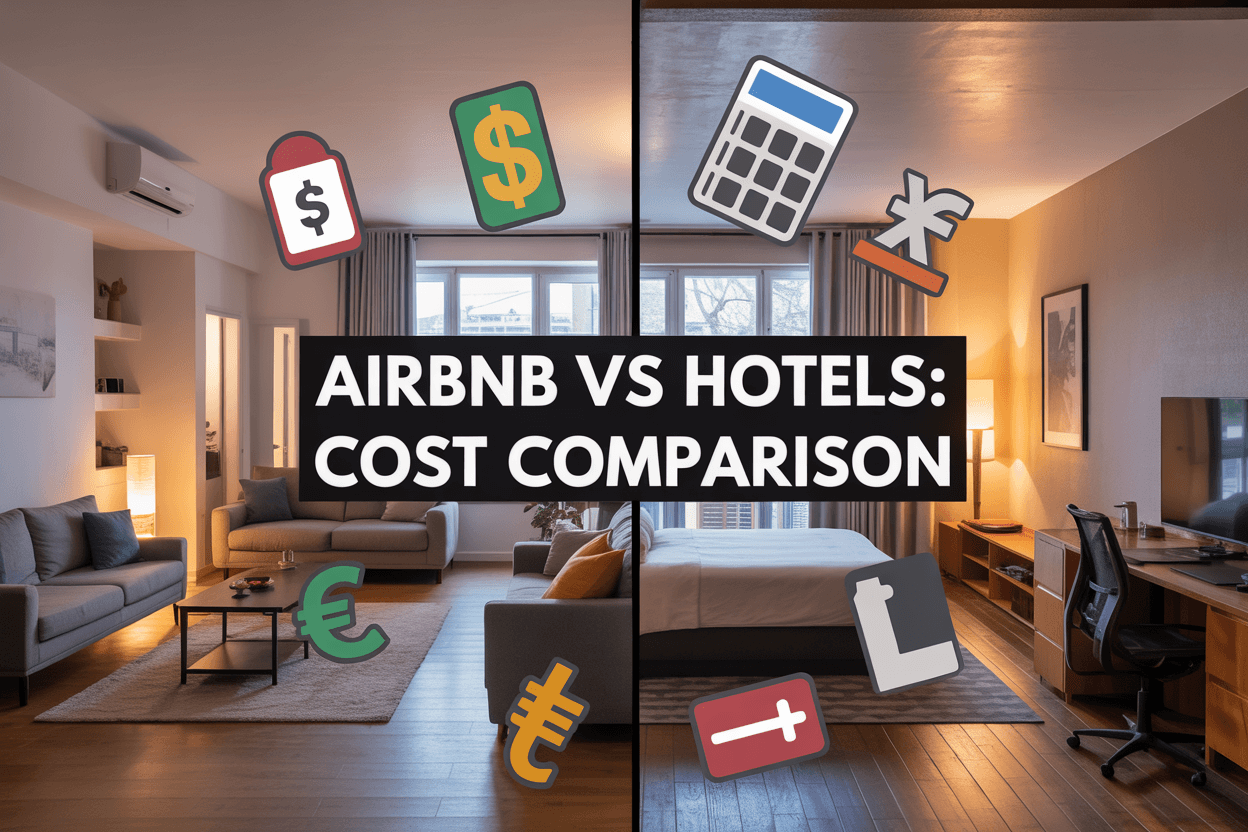
Planning international travel and wondering which accommodation option will stretch your dollars further? For budget-conscious travelers heading abroad, choosing between Airbnb vs hotels cost comparison can make or break your travel budget.
This guide is for travelers who want to maximize their overseas accommodation costs without sacrificing comfort or convenience. We’ll break down the real numbers behind budget travel accommodation abroad so you can make smart decisions for your next trip.
We’ll explore how base pricing models differ between platforms and examine the accommodation features that actually impact your bottom line. You’ll also discover how your destination choice affects international travel lodging savings and why your trip length plays a bigger role in costs than you might expect.
Understanding Base Costs and Pricing Models

Airbnb nightly rates vs hotel room rates by destination
The Airbnb vs hotels cost comparison reveals striking differences across international destinations. In major European cities like Paris and Rome, mid-range hotels typically charge $150-300 per night, while comparable Airbnb properties range from $80-200. However, this gap narrows significantly in Asian markets like Tokyo or Bangkok, where budget hotels can compete more aggressively with vacation rentals.
Popular tourist destinations show the most dramatic pricing disparities. In Barcelona, a centrally-located hotel room averages $180 per night during peak season, while an entire Airbnb apartment in the same neighborhood costs around $120. But in business-focused cities like Zurich or Singapore, hotel vs Airbnb pricing analysis often favors hotels during weekdays when corporate rates apply.
Overseas accommodation costs also vary by property type. While hotels offer standardized room categories, Airbnb presents everything from shared rooms at $25 per night to luxury villas exceeding $500. This flexibility makes Airbnb particularly attractive for group travel, where splitting a three-bedroom apartment often beats booking multiple hotel rooms.
Regional pricing patterns emerge when examining international travel lodging savings. Mediterranean coastal areas show 30-40% savings with Airbnb during summer months, while Northern European cities like Stockholm or Copenhagen maintain smaller price differences year-round due to consistent hotel demand from business travelers.
Hidden fees that impact your total accommodation budget
Budget travel accommodation abroad requires careful attention to fees that hotels and Airbnb hosts add beyond advertised rates. Hotels commonly charge resort fees ($20-50 per night), parking fees ($15-40 daily), and WiFi charges in some international properties. European hotels frequently add city taxes ranging from €1-7 per person per night, which can accumulate quickly for longer stays.
Airbnb’s fee structure operates differently but can be equally impactful. The platform charges guests a service fee of 12-14% of the subtotal, while hosts pay 3% of the booking amount. Cleaning fees, set by individual hosts, typically range from $30-150 depending on property size and location. Some hosts also impose additional charges for extra guests, late check-in, or amenities like towels and linens.
Currency conversion fees represent another hidden cost when booking cheap accommodation options abroad. Credit card companies usually charge 2-3% foreign transaction fees, while some booking platforms add their own currency conversion margins. Using local payment methods or cards without foreign transaction fees can save 3-5% on total accommodation costs.
Security deposits create temporary budget impacts. Hotels place holds of $50-200 per night on credit cards, while Airbnb hosts may require deposits up to $1,000 for luxury properties. These holds don’t represent actual charges but can affect available credit during travel.
Seasonal pricing fluctuations and booking timing strategies
Travel budget tips international planning must account for dramatic seasonal price swings. Mediterranean destinations see 200-300% price increases from low season (November-February) to peak summer months. Paris Airbnb rates jump from $75 average in January to $175 in July, while comparable hotel increases typically range 150-200%.
Booking timing strategies differ between accommodation types. Hotels often release their best rates 3-4 months in advance, with prices gradually increasing closer to travel dates. Last-minute hotel deals do exist but carry significant risk in popular destinations. Airbnb pricing follows different patterns – hosts frequently offer early-bird discounts for bookings made 4-6 months ahead, while last-minute bookings (under 7 days) sometimes yield 20-30% discounts from desperate hosts.
Vacation rental vs hotel prices show varying sensitivity to local events. Hotels in business districts charge premium rates during conferences and trade shows, while leisure-focused Airbnb properties remain unaffected. Conversely, major festivals or holidays drive up vacation rental prices more dramatically than hotel rates in residential neighborhoods.
Smart travelers track pricing patterns using comparison tools and price alerts. Tuesday and Wednesday bookings often cost 10-15% less than weekend reservations, while avoiding national holidays in destination countries prevents unnecessary price spikes. Flexible date searches can reveal significant savings – shifting travel dates by just 2-3 days sometimes reduces international travel expenses comparison by 25-40%.
Accommodation Features That Affect Your Travel Budget
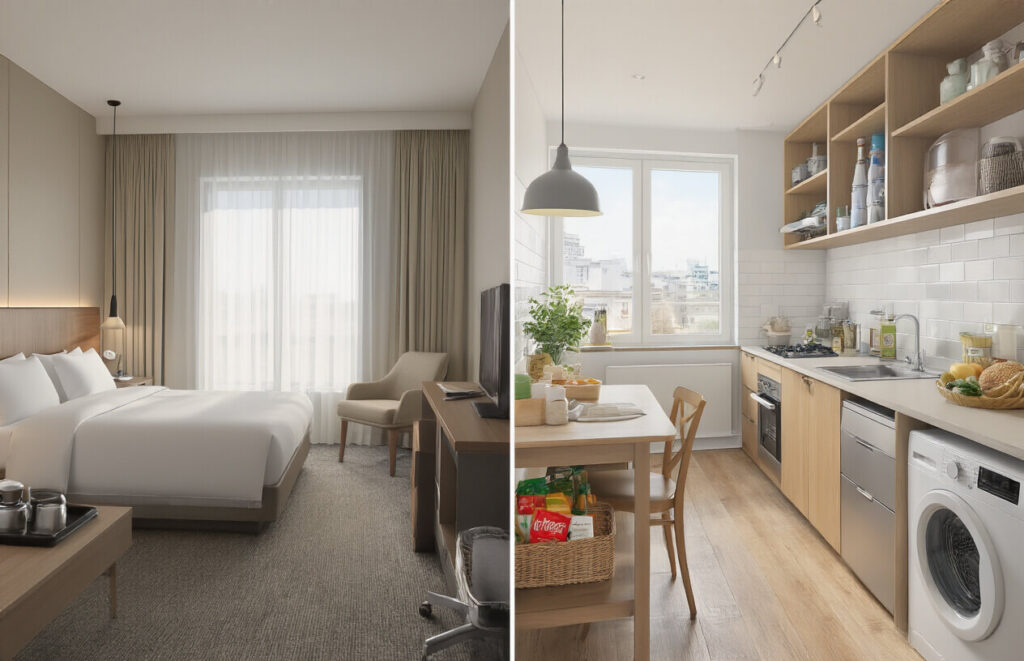
Kitchen Access Saves Money on Dining Expenses
Having a kitchen fundamentally changes your travel budget equation. When you book an Airbnb with full kitchen facilities, you’re essentially importing your home cooking habits to your destination. Restaurant meals abroad can easily cost $20-50 per person daily, while grocery shopping and cooking your own meals typically runs $8-15 per day.
The savings multiply quickly for families or groups. A family of four spending $80 daily on restaurant meals could slash that to $25-30 with home cooking. Over a week-long international trip, that’s a difference of $350-385. Hotels rarely offer more than a mini-fridge and coffee maker, limiting your food preparation options to basic snacks.
Kitchen access also lets you experience local culture through grocery shopping and farmers’ markets. You can buy regional ingredients, local wines, and specialty items that would cost significantly more at restaurants. Many travelers find this approach more authentic than tourist-oriented dining establishments.
Free Laundry Facilities Reduce Packing and Cleaning Costs
Laundry access dramatically impacts both your luggage strategy and travel expenses. With washing machines and dryers available in most Airbnb properties, you can pack half the clothes you’d normally bring. This translates to smaller suitcases, potential savings on airline baggage fees, and more room for souvenirs.
Hotel laundry services are notoriously expensive – often charging $5-15 per item. A week’s worth of laundry at a hotel could easily cost $100-200. Airbnb laundry facilities are typically free, requiring only detergent costs of $2-5 for your entire stay.
Long-term travelers particularly benefit from this arrangement. Digital nomads and extended vacation travelers can maintain a minimal wardrobe without the constant expense of professional cleaning services or the inconvenience of hand-washing items in hotel sinks.
Group Accommodation Options Split Costs Effectively
Group travel economics heavily favor vacation rental properties over multiple hotel rooms. A four-bedroom Airbnb that costs $300 per night split among eight travelers equals $37.50 per person. Compare this to hotel rooms averaging $150-200 per night, requiring four separate bookings for the same group.
Beyond the obvious per-person savings, group accommodations create shared living spaces that enhance the travel experience. Everyone gathers in common areas, shares meals, and splits grocery costs. The social dynamics often lead to additional savings as groups cook together, share transportation, and make collective decisions about activities.
Large groups also benefit from vacation rental amenities like multiple bathrooms, parking spaces, and entertainment areas. Hotels charge extra for rollaway beds, additional guests, and parking – costs that are typically included in vacation rental pricing.
Parking and Wi-Fi Inclusion Comparisons
Urban hotels frequently charge $20-40 daily for parking, while many Airbnb properties include free parking spaces. Over a week-long stay, parking fees alone can add $140-280 to your hotel bill. This becomes particularly relevant when renting a car for exploring areas outside city centers.
Wi-Fi represents another hidden cost differential. While most accommodations now include internet access, hotels may charge premium rates for high-speed connections or limit device connections. Business travelers and digital nomads often find Airbnb properties offer better, unrestricted internet access included in the base price.
| Feature | Hotels | Airbnb |
|---|---|---|
| Parking | $20-40/night | Usually included |
| Wi-Fi | Basic free, premium paid | High-speed included |
| Kitchen | Mini-fridge only | Full kitchen facilities |
| Laundry | $5-15/item | Free facilities |
The cumulative effect of these amenities significantly impacts your budget travel accommodation abroad decisions, often making vacation rental vs hotel prices favor the rental option for cost-conscious international travelers.
Location-Based Savings and Transportation Impact
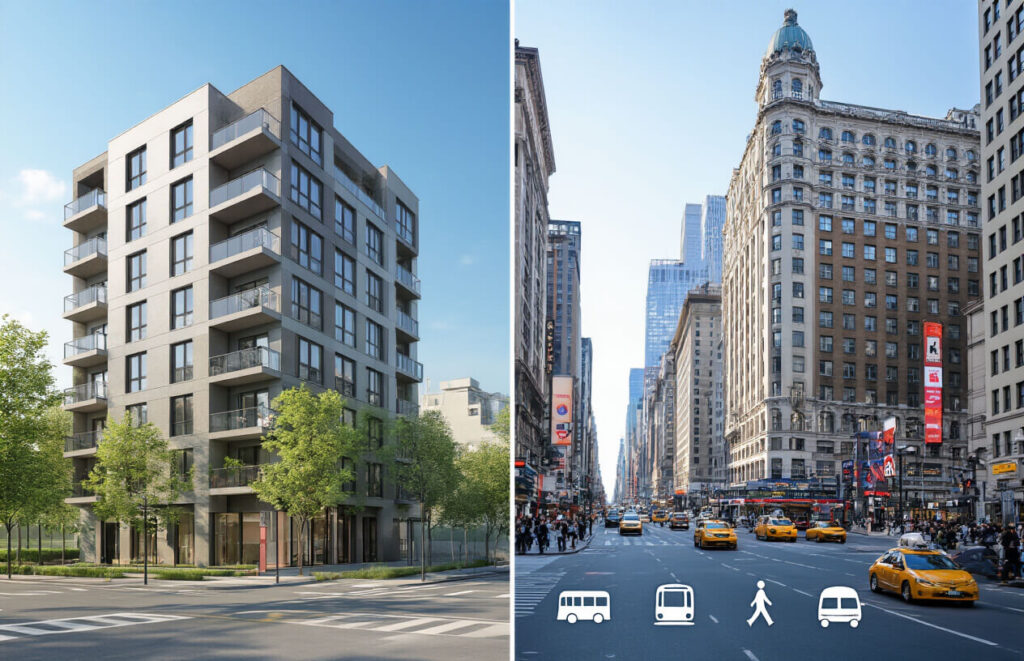
Neighborhood choices influence daily transportation costs
Your choice of neighborhood dramatically shapes your daily travel expenses, often making the difference between budget-friendly and wallet-draining trips. Airbnb properties tucked away in residential areas typically offer lower nightly rates while hotels cluster in expensive downtown cores where real estate costs drive up prices.
The math works like this: staying in a local neighborhood might save you $30-50 per night on accommodation, but you’ll spend $10-20 daily on transportation to reach major attractions. Over a week-long trip, you’re looking at potential savings of $140-280 on lodging versus $70-140 in transport costs – a clear win for the suburban strategy.
Smart travelers use apps like Citymapper or Google Maps to calculate actual commute times and costs before booking. A 20-minute metro ride from an affordable neighborhood often costs less than paying premium rates for central locations. Plus, residential areas give you authentic local experiences that touristy hotel districts simply can’t match.
Consider this budget travel accommodation strategy: book that charming Airbnb in Barcelona’s Gràcia district instead of a hotel near Las Ramblas. You’ll pay 40% less per night and discover neighborhood tapas bars where locals actually eat, not just overpriced tourist traps.
Distance from tourist areas affects accommodation rates
Properties located just 2-3 kilometers from major tourist zones can cost 30-60% less than their centrally-located counterparts. This pricing gap becomes even more pronounced in expensive destinations like Paris, Tokyo, or New York, where overseas accommodation costs skyrocket near famous landmarks.
Hotels face enormous overhead costs in prime tourist areas – higher rent, premium staffing, and tourist-tax burdens that get passed directly to guests. Airbnb hosts in residential neighborhoods avoid these commercial premiums, creating natural savings opportunities for budget-conscious travelers.
The sweet spot lies in areas that locals call home but tourists often overlook. These neighborhoods offer authentic cultural experiences while keeping your vacation rental vs hotel prices comparison firmly in Airbnb’s favor. A Parisian apartment in the 11th arrondissement costs significantly less than Marais hotels, yet you’re still minutes from major attractions via metro.
Research reveals that staying just one neighborhood away from main tourist districts can reduce accommodation costs by $50-100 per night in major European cities. That’s $350-700 saved on a week-long trip – money better spent on experiences, food, or extending your journey.
Public transportation accessibility reduces travel expenses
Well-connected public transportation transforms seemingly distant accommodations into strategic money-saving choices. Cities with efficient metro systems like London, Berlin, or Singapore make suburban Airbnb stays incredibly practical and economical.
Before booking any accommodation, check transit apps to understand real connectivity. A property that’s 15 minutes from a major subway line often provides better value than downtown hotels that require expensive taxis for evening activities. Monthly or weekly transit passes further amplify these international travel lodging savings.
Smart travelers factor transportation infrastructure into their Airbnb vs hotels cost comparison. Properties near metro stations, bus hubs, or tram lines unlock the entire city at fraction of taxi costs. In Tokyo, staying near a JR line station in residential Shibuya costs less than Ginza hotels while providing superior access to the entire metropolitan area.
Public transportation also offers cultural immersion that hotel shuttles and taxis can’t match. You’ll interact with locals, understand daily rhythms, and discover neighborhood gems that tour groups never see – all while keeping your travel budget tips international strategy on track.
Length of Stay Considerations

Weekly and Monthly Discount Advantages in Airbnb
Airbnb properties often offer significant savings for extended stays, with many hosts providing automatic discounts for weekly bookings (20-25% off) and monthly stays (30-50% off regular nightly rates). This pricing structure makes vacation rental vs hotel prices particularly favorable for longer trips abroad. When you’re planning a two-week European adventure or a month-long work retreat in Southeast Asia, these discounts can slash hundreds of dollars from your accommodation costs.
The weekly discount sweet spot typically kicks in after seven nights, while monthly rates become available after 28 days. Some hosts even offer custom pricing for stays between these periods, especially during off-peak seasons. For budget travel accommodation abroad, these extended stay discounts can transform an expensive destination into an affordable one.
Hotel Loyalty Program Benefits for Extended Stays
Hotels counter Airbnb’s long-stay advantages through loyalty programs that reward frequent guests and extended bookings. Major hotel chains offer elite status perks like free breakfast, room upgrades, late checkout, and earning points toward future stays. These benefits become more valuable during longer trips, where daily breakfast savings alone can add up to $200-400 per week.
Corporate rates and extended stay hotel chains like Extended Stay America or Residence Inn provide competitive weekly and monthly rates, often including amenities like kitchenettes and complimentary Wi-Fi. Some hotels offer “stay 7, pay 5” promotions or similar deals that make international travel lodging savings comparable to vacation rentals.
Break-Even Points for Short vs Long-Term Bookings
The cost comparison between Airbnb and hotels shifts dramatically based on stay duration. For trips lasting 1-3 nights, hotels often prove more economical due to Airbnb’s cleaning fees and lack of daily housekeeping. The break-even point typically occurs around 4-5 nights, where Airbnb’s lower nightly rates begin offsetting initial fees.
For stays exceeding one week, Airbnb consistently outperforms hotels in most destinations, with savings increasing proportionally to trip length. A 10-day stay might save 15-20%, while a month-long booking could reduce accommodation costs by 40-60% compared to equivalent hotel stays.
| Stay Duration | Airbnb Advantage | Hotel Advantage |
|---|---|---|
| 1-2 nights | Lower rates without cleaning fees | No cleaning fees, daily service |
| 3-6 nights | Competitive with discounts applied | Loyalty benefits, convenience |
| 1-2 weeks | 20-30% savings typical | Limited, mainly through promotions |
| 1+ months | 40-60% savings common | Extended stay hotel rates competitive |
Cleaning Fees Impact on Stay Duration Decisions
Cleaning fees represent Airbnb’s biggest pricing disadvantage for short stays, typically ranging from $50-150 per booking regardless of stay length. This fixed cost dramatically impacts the per-night calculation for brief trips. A $100 cleaning fee adds $50 per night to a two-night stay but only $3.33 per night to a month-long booking.
Smart travelers factor cleaning fees into their overseas accommodation costs calculations before booking. For weekend getaways or short city breaks, this fee can make a $80/night Airbnb more expensive than a $120/night hotel. However, for extended international travel, the cleaning fee becomes negligible when spread across multiple weeks.
Some hosts waive or reduce cleaning fees for longer stays, recognizing that extended bookings reduce their turnover costs and vacancy periods. When evaluating cheap accommodation options abroad, always calculate the total cost including cleaning fees rather than focusing solely on the advertised nightly rate.
Additional Services and Their Cost Implications

Hotels typically include daily housekeeping in their room rates, which seems like a clear advantage for travelers who prefer fresh towels and made beds. However, this convenience factor directly impacts your international travel expenses comparison since hotels build these labor costs into their pricing structure.
Airbnb properties often charge separately for cleaning fees, usually ranging from $50-150 per stay regardless of duration. While this upfront cost might seem steep for short trips, longer stays benefit from this fixed pricing model. Many Airbnb hosts don’t provide mid-stay cleaning unless you pay extra, typically $30-80 per service.
The real savings emerge when you consider your actual needs. Business travelers staying 2-3 nights might prefer hotel housekeeping convenience, while vacation renters staying a week can handle basic tidying themselves and pocket significant savings.
Concierge services and local recommendations value
Full-service hotels abroad provide 24/7 concierge assistance, helping with restaurant reservations, tour bookings, and local navigation. This service adds considerable value for first-time international visitors but comes at a premium reflected in higher room rates.
Airbnb hosts often provide personalized local recommendations through detailed guidebooks or direct communication. Many hosts share insider knowledge about neighborhood gems, public transport shortcuts, and authentic dining spots that concierge services might overlook. However, this support depends entirely on individual host engagement levels.
Smart travelers can bridge this gap by researching destinations beforehand and using travel apps, potentially making expensive concierge services unnecessary while enjoying Airbnb’s cost advantages.
Security deposits and damage protection fees
Hotels handle incidental charges through credit card authorization, typically holding $50-200 per night without actually charging your account unless damages occur. This system provides peace of mind without upfront payments.
Airbnb properties require actual security deposits ranging from $100-500, temporarily reducing your available credit or requiring cash deposits. Some platforms now offer damage protection insurance for $15-30 per booking instead of traditional deposits, which many travelers prefer.
Understanding these policies helps budget conscious travelers plan their overseas accommodation costs more accurately and avoid unexpected financial holds during international trips.
Guest support availability during your stay
Hotel chains maintain round-the-clock front desk support, maintenance teams, and management presence. Problems get resolved immediately, from broken air conditioning to lost key cards. This reliability factor justifies higher rates for many international travelers.
Airbnb support operates differently, relying primarily on host responsiveness and platform customer service. While many hosts respond quickly to issues, late-night emergencies might leave guests waiting until morning for resolution. Remote host management can complicate urgent situations in foreign countries.
Some Airbnb properties now offer professional management services that bridge this gap, providing hotel-like support at vacation rental prices. These hybrid options represent the sweet spot for budget travel accommodation abroad, combining cost savings with reliable guest services.
Real-World Cost Analysis by Popular Destinations

Prague stands out as an Airbnb vs hotels cost comparison goldmine, where vacation rental vs hotel prices show dramatic differences. A centrally-located Airbnb apartment averages $45-65 per night, while comparable hotels charge $80-120. Barcelona follows a similar pattern – expect to pay $55-85 for Airbnb properties versus $95-150 for hotels in the Gothic Quarter or near Las Ramblas.
Paris presents a more complex picture. Budget hotels in outer arrondissements start around $70-90, while Airbnb options in the same areas range $60-100. However, central Paris Airbnb properties often match or exceed hotel prices at $120-200 per night. The cleaning fees can add $30-50 to your total stay.
Amsterdam’s canal district shows Airbnb winning decisively. Hotel rooms average $140-220 nightly, while canal-side apartments rent for $80-140. Rome offers mixed results – Trastevere Airbnb properties cost $65-110 versus nearby hotels at $85-140, but Vatican area accommodations price similarly across both platforms.
| City | Airbnb Average | Hotel Average | Winner |
|---|---|---|---|
| Prague | $45-65 | $80-120 | Airbnb |
| Barcelona | $55-85 | $95-150 | Airbnb |
| Amsterdam | $80-140 | $140-220 | Airbnb |
| Rome | $65-110 | $85-140 | Airbnb |
Asian markets where hotels often beat Airbnb rates
Thailand’s hospitality industry heavily favors hotels for budget travel accommodation abroad. Bangkok’s mid-range hotels offer rooms for $25-45, while comparable Airbnb listings start at $35-55. The hotel advantage increases in beach destinations like Phuket, where resort-style hotels provide $40-70 rates compared to vacation rentals at $55-90.
Japan presents the starkest contrast for overseas accommodation costs. Tokyo business hotels average $60-90 per night, while Airbnb properties in similar neighborhoods cost $80-130. Kyoto shows even wider gaps – traditional ryokan-style hotels at $70-110 versus Airbnb at $90-150. The language barrier and strict Airbnb regulations have kept supply limited, inflating prices.
Vietnam and Cambodia strongly favor hotels. Ho Chi Minh City boutique hotels charge $30-50 versus Airbnb at $35-65. Siem Reap near Angkor Wat offers exceptional hotel values at $20-40, while vacation rentals rarely drop below $40-60.
Singapore bucks the trend slightly, with hotels and Airbnb pricing closely matched at $80-120 for comparable quality, though hotels often include breakfast and better locations.
North American destinations and seasonal variations
Montreal showcases dramatic seasonal swings in hotel vs Airbnb pricing analysis. Summer festivals push hotel rates to $120-180, while Airbnb properties increase moderately to $70-110. Winter reverses this trend – hotels drop to $60-90 while Airbnb rates remain steady at $65-105.
New York City delivers consistent Airbnb advantages year-round. Manhattan hotels average $150-250, while Brooklyn Airbnb options offer $80-140 with easy subway access. Peak summer and holiday periods see hotels spike to $200-350, but Airbnb increases remain modest at $100-180.
Vancouver’s international travel lodging savings heavily depend on timing. Summer brings hotel rates of $140-220 versus Airbnb at $90-150. Winter skiing season flips these numbers – Whistler proximity drives Airbnb to $120-200 while city hotels moderate to $80-130.
Mexico presents unique patterns for cheap accommodation options abroad. Cancun’s hotel zone averages $80-140, competitive with Airbnb at $70-130. However, authentic neighborhood Airbnb properties in Playa del Carmen or Tulum offer superior value at $45-85 versus resort hotels at $120-250.
Toronto mirrors Montreal’s seasonal extremes. Summer Blue Jays season and festivals push downtown hotels to $160-240, while suburban Airbnb properties stay reasonable at $75-125. Winter brings hotel deals at $90-140, making the travel budget tips international calculation more complex.
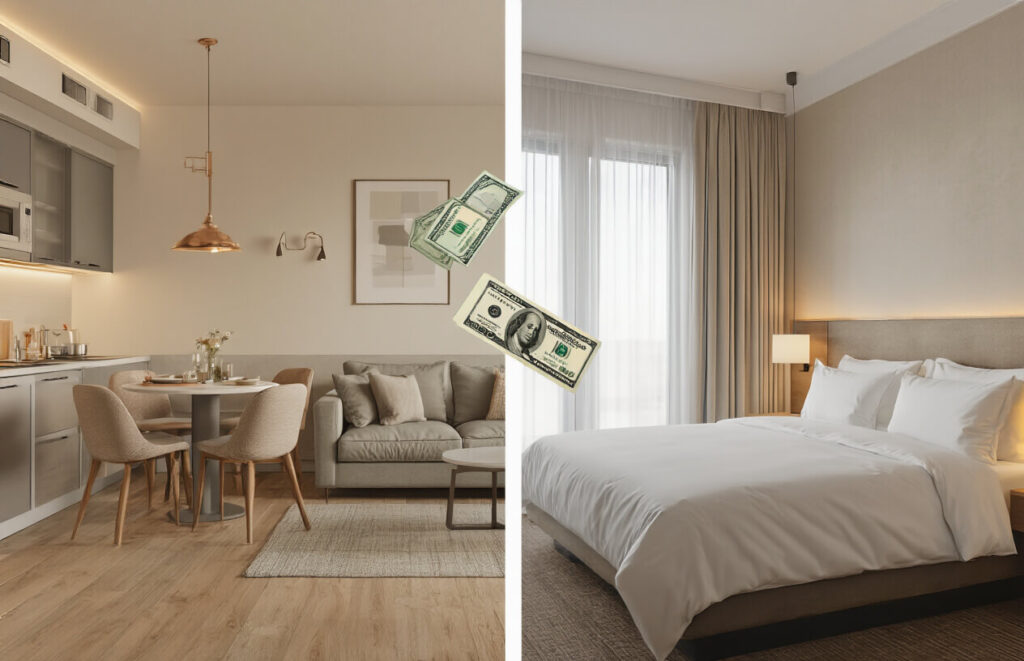
Money talks when you’re planning a trip, and choosing between Airbnb and hotels can make or break your travel budget. Hotels often win for short trips with their all-inclusive packages and prime locations that cut down on transport costs. But Airbnb shines for longer stays, especially when you factor in kitchen access that lets you skip expensive restaurant meals and book entire apartments that split costs among groups.
The real winner depends on your travel style and destination. Business travelers might find hotels more cost-effective with their loyalty programs and consistent service levels. Families and groups traveling for a week or more will likely save big with Airbnb properties that offer space, kitchens, and local neighborhood experiences. Before booking your next trip, crunch the numbers for your specific situation – include hidden fees, transportation costs, and meal expenses to see which option actually puts more money back in your pocket.

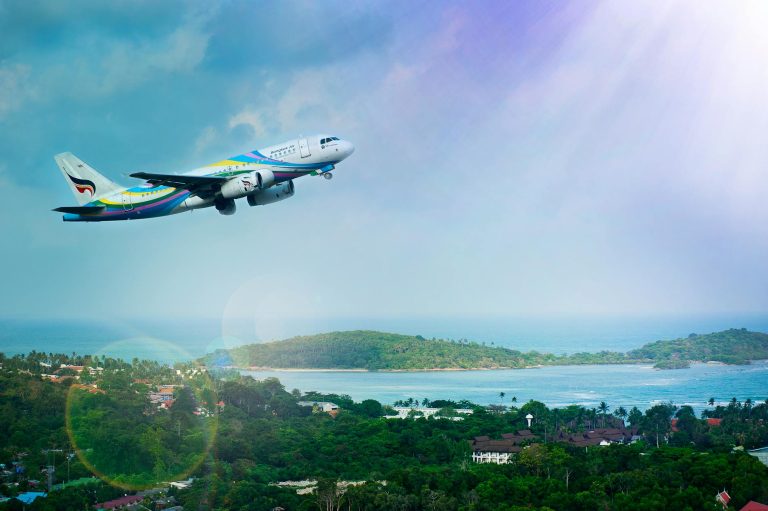

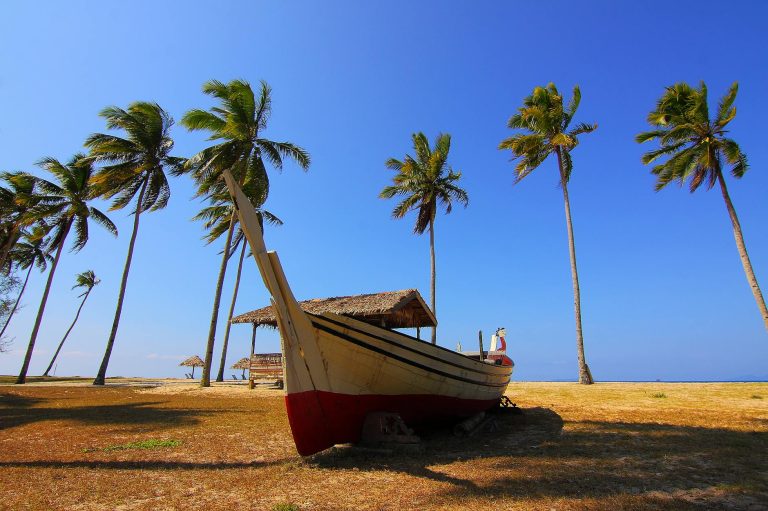

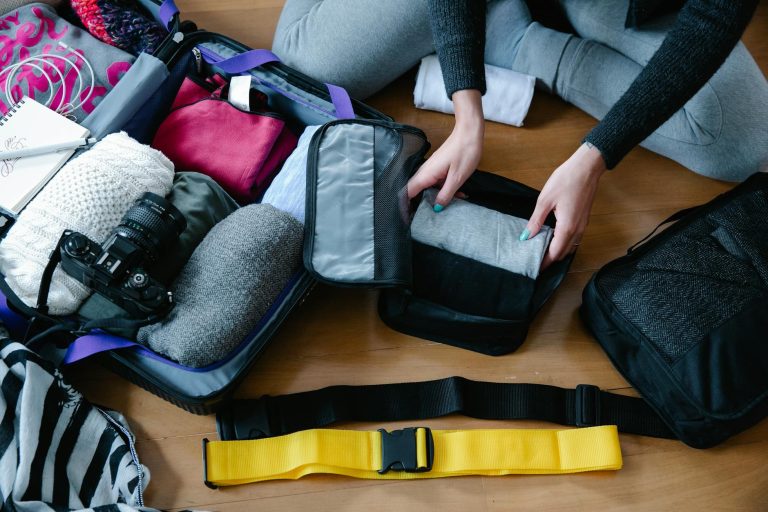

Excellent goods from you, man. I’ve take into account your stuff previous to and you are just extremely fantastic. I really like what you have acquired here, certainly like what you are stating and the way in which you say it. You make it enjoyable and you still care for to stay it sensible. I cant wait to read much more from you. That is actually a great web site.
It’s actually a great and helpful piece of information. I’m satisfied that you shared this helpful info with us. Please stay us up to date like this. Thanks for sharing.
Hi there just wanted to give you a quick heads up. The text in your content seem to be running off the screen in Chrome. I’m not sure if this is a format issue or something to do with browser compatibility but I figured I’d post to let you know. The design and style look great though! Hope you get the problem fixed soon. Kudos
The structure of this piece is excellent.
Wow! Thank you! I continuously wanted to write on my blog something like that. Can I include a portion of your post to my website?
Have you ever thought about adding a little bit more than just your articles? I mean, what you say is fundamental and all. However think of if you added some great photos or videos to give your posts more, “pop”! Your content is excellent but with images and clips, this website could undeniably be one of the best in its field. Great blog!
Its such as you read my mind! You appear to understand so much about this, like you wrote the book in it or something. I believe that you just can do with a few p.c. to force the message house a little bit, but other than that, this is fantastic blog. A fantastic read. I’ll definitely be back.
I love how you backed up every point with real examplesmade the whole topic so relatable and easy to understand. Thanks for putting in the time to create this!
Your point of view caught my eye and was very interesting. Thanks. I have a question for you.